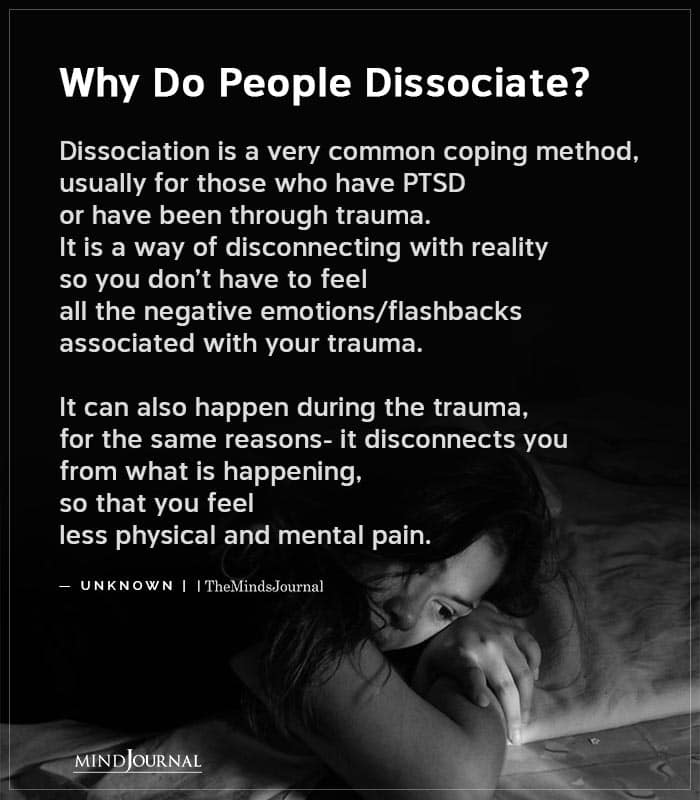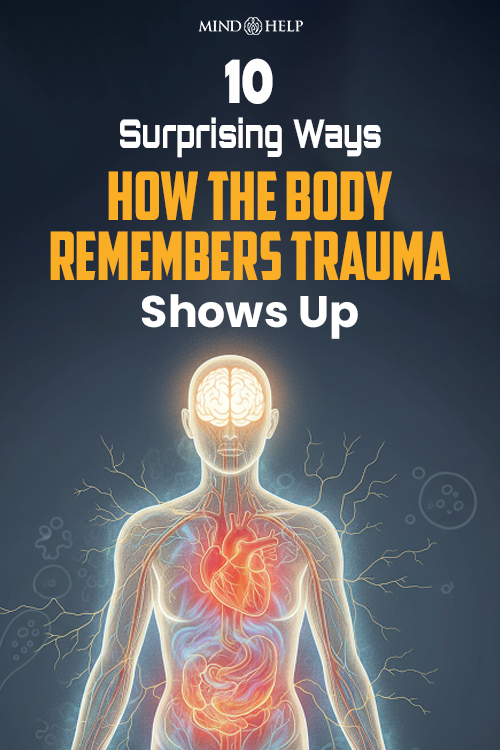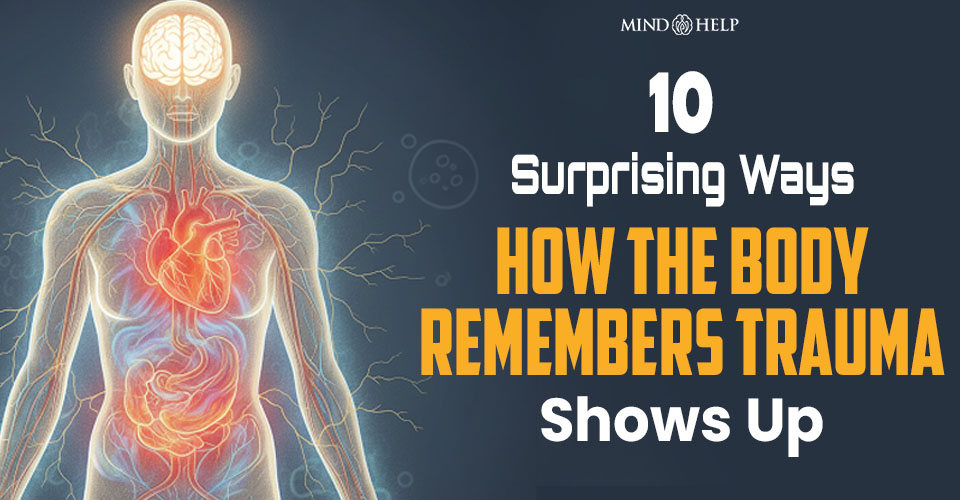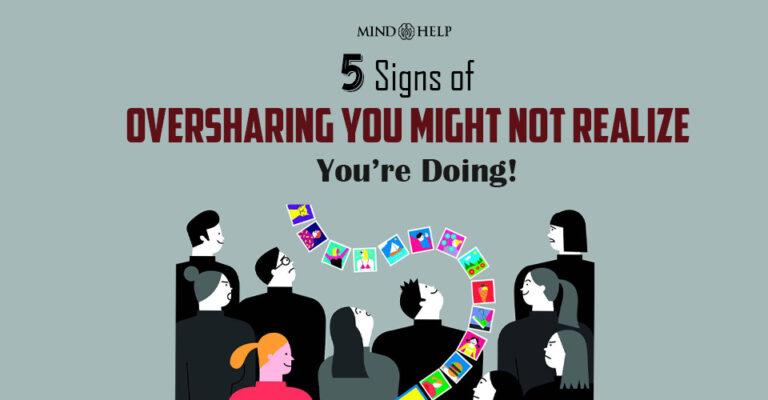How the body remembers trauma isn’t just a theory, it’s something many of us live with every single day. Trauma stored in the body doesn’t quietly disappear; it shows up in sneaky, frustrating ways.
Maybe it’s that constant jaw clench, stomach drama that comes out of nowhere, or headaches that won’t quit.
Holding emotional trauma in the body can feel like dragging around invisible baggage, and holding trauma in the body for years can be physically and mentally exhausting.
The good news? Spotting these signs is the first step toward healing. Let’s unpack 10 ways your body keeps the score.
Related: Understanding Emotional Triggers: 5 Ways To Keep It In Check
10 Everyday Struggles That Prove How the Body Remembers Trauma
1. Dissociation
You know that weird feeling when you are there, but not really there? Like you are watching yourself from the outside, or the world feels fuzzy? That’s dissociation, and it’s one of the clearest signs of you are holding trauma in the body.
It’s basically your nervous system saying, “Nope, too much, shutting down now.” While this can help you survive overwhelming stuff in the moment, living on autopilot long-term can leave you feeling disconnected from yourself.
The key to healing is gently reassuring your body that it’s safe to return to the present. Grounding techniques like affirmations, 5-4-3-2-1 breathing, visualization etc. can help you feel real again.

2. Muscle Tension
That stiff neck? The sore back? The jaw that aches like it fought an alligator last night? Yes, that’s trauma stored in the body flexing its hold. When your nervous system is trapped in a fight-or-flight mode, your muscles prime for threat, even when there isn’t one.
Gradually, over time this manifests as chronic muscle pain and tension. Trauma stored in the body feels like carrying around invisible weights throughout the day. Releasing it isn’t just about stretching; it’s about reminding your body you are safe now.
Think yoga, dance, breathwork, or even just shaking it out when nobody’s watching.
3. Chronic Pain
Chronic pain is one of those frustrating mysteries where doctors sometimes say, “We can’t find anything wrong.” But when you are holding trauma in the body, that pain is very real.
Trauma rewires how your brain processes signals, meaning your body might scream “danger! ” long after the threat is over. Migraines, joint pain, and random aches can all be the body’s way of re-staging emotional wounds.
It’s not “all in your head”, it’s how the body remembers trauma. Addressing the root cause through therapy, somatic practices, or even creative outlets can actually dial down the pain.
4. Skin Problems
Your skin is like a giant billboard for your nervous system. When you are holding emotional trauma in the body, it tends to show up as acne, eczema, hives, or skin rashes. Stress hormones keep the body in overdrive at all times, and your skin pays the price.
Have you ever broken out when things get a bit too overwhelming and stressful? Or does your itchy patches flare up after a painful memory resurfaces? That’s trauma stored in the body pushing its way to the surface.
Calming your body from the inside out, be it through mindfulness, therapy, or just slowing down, often helps your skin chill, too.
5. Immune System Problems
If you are easily afflicted with cold and flu, then it may be stored trauma at play here. Holding trauma in the body keeps your stress response switched “on,” which suppresses your immune system. Instead of protecting you, it gets stuck in burnout mode.
People with unresolved trauma tend to get ill more frequently, or recover very slowly from even the smallest things. Trauma stored in the body muddles your defenses, and it becomes more difficult to fight back.
Healing isn’t only emotional – it literally makes your body stronger and more resilient. Things like therapy, and rest that are calming to the nervous system can help reboot your immunity.
Related: 8 Types Of Inner Child Wounds: Why You Feel ‘Too Much’ Or ‘Not Enough’
6. Body Size Changes
Trauma doesn’t just mess with your mind, it can throw your body size all over the place. Some people gain weight, others lose it, and for many it’s a back-and-forth cycle. Why? Because holding trauma in the body impacts hormones, appetite, and metabolism.
Maybe food becomes comfort, or maybe your stomach shuts down completely when you are stressed. Trauma stored in the body means your system is trying to cope the only way it knows how. Instead of blaming yourself, recognize this as survival.
Healing helps your body find balance again, because it’s not really about the number on the scale.
7. Sweating
Are you experiencing random hot flashes? Well, trauma might be a major cause. Holding emotional trauma in the body can flip your nervous system into overdrive, triggering sweaty palms or night sweats even when you are not hot or working out.
It’s your body’s way of releasing nervous energy, like it’s trying to dump the excess stress. Flashbacks, nightmares, or even harmless triggers can set it off. Annoying, yes. But also a clue your body is still carrying past pain.
Breathwork, grounding, and body-based therapies can go a long way in helping you dial down the heat (literally).
8. Nausea and Cravings
How the body remembers trauma? Did you know trauma has a favorite hiding place, and it’s your gut? That sudden wave of nausea before a tough conversation? Or the uncontrollable craving for sweets after a stressful day? That’s trauma talking.
Trauma often hijacks the gut-brain connection, swinging between “I can’t eat anything” and “give me all the snacks right now.” These cravings and stomach flips aren’t weakness, they are survival strategies.
When you work through the emotional root, your gut calms down, and cravings lose their power. Until then? Be gentle with yourself, because your body is just trying to cope.

9. Digestive Issues
Digestive drama – cramps, bloating, diarrhea, and constipation is another way the body remembers trauma. Your gut has more nerves than the brain, which is why it’s known as the “second brain.”
When you are holding trauma in the body, it keeps all those nerves humming, which disrupts digestion. Trauma stored in the body basically tricks your stomach into acting like it’s under attack.
It’s really no surprise that Irritable Bowel Syndrome (IBS) and unresolved trauma so often go hand in hand. Healing practices like meditation, deep breathing, or even gentle eating rituals can help your gut finally stop carrying what your mind hasn’t processed yet.
10. Headaches and Flashbacks
Headaches and flashbacks are like your brain’s version of trauma reruns. Holding emotional trauma in the body means the nervous system struggles to separate “then” from “now.”
So out of nowhere, you might get slammed with a memory that feels terrifyingly real, and with it, a pounding headache or migraine.
Trauma literally hijacks your headspace. It’s painful, it’s exhausting, and it’s proof your body hasn’t forgotten what your mind is trying to bury. The path to easing these? Grounding, therapy, and teaching your brain that the past doesn’t control you anymore.
Here’s the thing: trauma doesn’t disappear with time. How the body remembers trauma manifests in your muscles, skin, gut, and even your head. It’s your body’s way of saying, “Hey, I’m still carrying this.”
Holding emotional trauma in the body is challenging, but it’s not a life sentence. With therapy, body-based practices, and time, you will be better able to release what your body has been holding onto.
Related: Healing Relational Trauma Through Divine Alchemy
Healing does not happen overnight, but every step you take towards healing and safety teaches your body that it’s finally okay to exhale.








